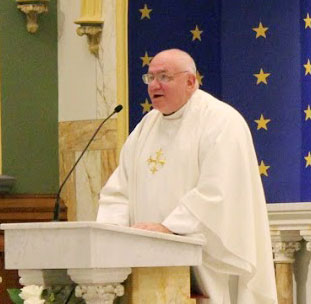By Father Ray Roden

And so it begins. News arrives by way of our people, young and old, of roustings by the U.S. Immigration and Customs Enforcement agency, commonly and appropriately known as ICE.
Parochial vicars, lay leaders and permanent deacons hear the stories as well. How does a pastor respond to second graders terrorized because they believe their parents might not be there when they come home from school?
Or to the elderly lady who bursts into tears in the middle of Mass because “they came into my house and took my husband”?
Or to the Dominican U.S. citizen born in Queens, daughter of citizens born here as well, stopped in her car on the streets of Manhattan. When documents were demanded, driver’s license, birth certificate and passport, she easily produced the license. But who carries their birth certificate and passport? She was given a summons to appear in court to prove that she is a citizen of her – and our – country.
Then there was the recent threat of violence, “bloodshed” was the word they used, against a brother priest, a neighboring pastor, should the flag of Mexico ever appear in church again as it did for his parish’s Guadalupe celebration last December.
“Because this is what our president wants,” he was told. My brother did what I would have done. He called the cops.
How to respond, indeed.
Last Saturday evening and all day Sunday, I preached at all 12 of our Masses at Our Lady of Sorrows parish in Corona because the moment had arrived, the first of many I’m sure in the current crisis, to console, to accompany, to be in solidarity with, to be church together.
Spirit moved, gently, mysteriously, powerfully, and the grace of Holy Orders came to mind not at all cynically. The support of my three brother priests who also accompany our people was moving, again that grace.
It wasn’t so bad, really, except that I had to preach the last three homilies seated because of the sharp pain that was like a knife in my lower back.
No, it was very good. Our Lady of Sorrows is Our Lady of Consolation.
In looking around, I noticed adults’ eyes glistening and the kids – little ones, teenagers and 20-somethings – jaws dropping or grinning. I was filled with gratitude.
The decisions and actions of our government with regard to immigrants and refugees since Jan. 20 have been despicable. Catholic support for those decisions has been embarrassing, leaving the Gospel mocked, or worse, ignored.
How to respond? The primacy of the spiritual, our prayer first and last, assures us of peace in the struggle, and joy. Turning to saints and heroes has always been our way in the Catholic thing, especially in tough times.
Pope Pius XI (1922-1939), for example, one of the greats, confronted by thug politicians in Europe, Mexico and elsewhere, got very much “in their face” over and over. In 1925, he established the liturgical Feast of Christ the King to call a world awash in “executive orders” back to reality. Twelve years later, his encyclical letter entitled, “With Deep Anxiety” raised defiance and resistance to new heights in the face of the grave sins of nationalism and religious persecution. Pius canonized Thomas More, Don Bosco and Therese Lisieux.
In that time of great resistance, Blessed Clemens von Galen, the “Lion of Muenster” was forbidden to distribute his homilies to the public. So he enlisted friends in the British Air Force who then dropped thousands of copies out of airplanes all over Germany.
Blessed Rupert Mayer was arrested repeatedly right out of the pulpit for his verbal broadsides against the criminal policies of his government. Each time he was ordered to cease and desist, he did it again. When he died of a heart attack on All Saints Day, 1945, he was in the pulpit, preaching.
Recently, I visited one of our parishioners in jail, where he was brought by ICE. Having gotten all the necessary permissions and clearances, I was told that there was no record of my appointment. I insisted that the officer look harder, hinting that I would call his supervisor to help. Had they not allowed the visit, I would have politely refused to leave, even if that meant getting arrested.
Blessed Miguel Pro, martyred in Mexico in 1927, came to mind with a chuckle. He used to say, “I hope they lock me up. I can use the rest!”
Suddenly the visitor’s permit was found and I was able to have a half-hour conversation with the man I came to see with no further fuss, other than having to speak on a telephone with security glass between us.
The day before Father Pro’s funeral, by the way, the government announced that the public was absolutely forbidden to attend under penalty of this or that. Thirty thousand people showed up for the forbidden Mass, filling Mexico City’s Holy Family Church and the streets all around the church.
The Servant of God Dorothy Day, who never fails to inspire and console, visited Blessed Miguel’s grave in those early years before his relics were enshrined at Holy Family.
And so it begins. Where will it end? I have no idea, but I don’t have a very good feeling about the outcome of the present crisis. I do know that we will continue to pray and walk together in solidarity and non-violent resistance. No one can take our joy from us. After all, our best documents are our baptismal certificates.
